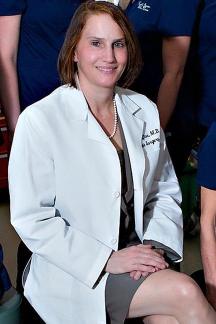Loftus Plastic Surgery Center
Natural Results from a National Expert
Right Here In Cincinnati and Northern KentuckySchedule a
Consultation
513-793-4000
859-426-5000
Breast Augmentation Risks
Possible Complications following Breast Augmentation
Dr. Loftus has found that, by taking the steps she recommends, she has been able to markedly reduce the risks of breast augmentation. On this page, she will share these steps.Breast augmentation can give you fabulous results. However, it also poses some risks that can lead to potential complications or unfavorable results. This page will provide an overview of the risks and complications associated with breast augmentation surgery.
Risks of Breast Augmentation
Capsular Contracture
Capsular contracture is a scar that forms around the implant, causing it to feel firm, look unnatural, and potentially hurt. When you see pictures of a woman with obvious implants who looks like she has "coconut breasts", she more than likely has a severe capsular contracture. If you develop a mild capsular contracture, you may not be bothered by it and may not even notice you have one. If you develop one that is moderate or severe, you will probably require breast surgery to correct the problem. Surgery involves removing the scar and replacing the existing implant with a new breast implant.
Placing the breast implant under the muscle has a lower risk of capsular contracture than placing the implant over the muscle which is one of the many reasons that Dr. Loftus recommends placement of implants below the muscle. Talk with your plastic surgeon about other ways to help minimize capsular contracture.
You can learn more about capsular contractures here.
Interference with Mammography
Breast implants do somewhat interfere with the ability of a mammogram to "see" all of your breast tissue. Placing the implant under the muscle allows for the least amount of interference. With the breast implant under your muscle, mammograms can "see" about 90% of your breast tissue. With the breast implant over the muscle (AKA under the breast), mammograms can "see" 75% of your breast tissue. Whether under or over the muscle, implants do not interfere with your ability to detect lumps in a self breast examination. Self exams are found to be the most successful way in discovering the majority of breast cancers. Implants also do not interfere with ultrasound or MRI scans, which are helpful in the evaluation of breast masses. Find out more about interference with mammography here.
Breast Implant Displacement
Breast implants can move out of position at anytime after breast augmentation surgery. They can move upward, downward, left or right. If they move only a little, you may not even notice. If they move a lot, you may need surgery to move them back into position. Fortunately, this problem is not common. The larger the implant, the greater the chance that it will displace downward. Find out more about breast implant displacement here.
Saline Implant Deflation
Saline implants can develop a leak and deflate. If this happens, your breast will shrink to its preoperative size over a matter of a day or so. You will need another breast augmentation surgery to replace the deflated implant. Implant deflation is most likely to occur in implants that have not been overfilled. Yes, you read that right. Overfilling breast implants reduces deflation. This is because deflation is a result of folding of the implant shell, which occurs repetitively in implants that are not overfilled. After the implant shell has folded hundreds or thousands of times with your natural body movement, the implant shell tears – just like a piece of paper that has been folded time after time. Risk of deflation is about 4% during the first year following breast augmentation surgery , the chance is then about 1% per implant per year for each year thereafter. You can find out more about saline implant deflation here.
Silicone Implant Rupture
Whereas saline implants are said to deflate when the silicone shell becomes disrupted, silicone gel breast implants are said to rupture. It really is the same thing, except that when silicone gel implant shells rupture, the silicone does not become quickly reabsorbed by your body. Hence, you might not know whether you have a rupture. If silicone gel extrudes out of the implant shell, then it might provoke an inflammatory response, leading to…that’s right….a capsular contracture. This is often the first sign of a silicone gel implant rupture. Whereas ruptures occurred with great frequency in implants made prior to 1992, the newer silicone gel implants have thicker shells and have a lower rupture rate. If you develop a moderate or severe capsular contracture with a silicone gel breast implant, then the usual treatment is surgical removal of the implant along with the capsule, which is really made up of surrounding scar tissue. A new implant can be placed at the same time. You can find out more about silicone gel implant rupture here.
Rippling
This is the visible appearance of waviness of the skin over your implants, like the ripples of a wave on a lake. Some doctors refer to this as "wrinkling." Rippling is rare with silicone, and more common with saline implants. The rippling occurs due to saline shifting around inside your implants. It is most troublesome if it occurs in the upper half of the breast, because it would be evident in low-cut clothing and swim wear. Rippling is less common when saline implants are over filled and is less common with smooth implants than with textured ones. Also, when the implants are placed under the muscle, there is less chance of rippling in the upper half of the breast. You can find out more about breast implant rippling here.
Infection
Infection, if it occurs, usually does so within two months of breast surgery. Infection occurs in about 1% of all implant surgeries. If an infection occurs it often requires antibiotics and the removal of the involved implant. A new implant can be placed six months later, which means you would have to go for six months with very uneven breasts. You can find out more about breast implant infections here. Dr. Loftus has found that the rate of infection can be lowered significantly with a few simple steps.
Nipple numbness
If the possibility of having numb nipples is unacceptable to you, you should not have breast augmentation because no plastic surgeon can guarantee preservation of nipple sensation. The national risk of having permanently numb nipples is about 15%. You can find out more about breast numbness and changes in sensation here.
Breast Feeding and Pregnancy
Breast feeding ability is not altered by implants. Many women ask about the effect of future pregnancy on augmented breasts. In most cases, implants will not affect the fate of your postpartum breasts. Here is why: following pregnancy (and breast feeding), your breasts will shrink to their pre-pregnancy size (or there about). During this process of shrinking, your breast skin may either tighten or not tighten. If it tightens, you will most likely not have breast droop. If it does not tighten, then your breasts will unfortunately droop. Whether or not the skin tightens has little or nothing to do with the presence or absence of breast implants.
Other Potential Complications and Risks Find out about sloshing here.
Find out about hematoma and bleeding here.
Find out about Breast implants and ALCL here
Need for Further Breast Surgery
Understand that if you receive any implant in your body – whether it be a pace maker, artificial joint, artificial heart valve, or anything – that one of the inherent risks is that you may need further surgery on it at some point in your life. With breast implants, you may need further surgery for capsular contracture, deflation, rippling, displacement, infection, desire for a different size, or another reason.
You may also go a lifetime without having any problems. But, it is most prudent to assume that at some point, you will probably want or need another surgery to address one of these problems. To reduce your risk of needing further breast surgery, be sure to visit Dr. Loftus' Breast Augmentation Tips for getting the best results. Information on that page will help you to reduce your risks, expedite your recovery, and ensure the best result.

About Dr. Loftus
Dr. Loftus is a female plastic surgeon who is considered a national authority on plastic surgery, having appeared on numerous talk shows as an expert. Her book has become a best-selling book on plastic surgery and has earned her the reputation as a vocal advocate of patient safety, satisfaction, and education in plastic surgery. No wonder her patients have such great things to say about her…

| My results are amazing - Dr. Loftus is amazing! |
Reviews on Loftus Plastic Surgery Center
TV Appearances of Dr. Loftus
Cincinnati: The Christ Hospital2139 Auburn Avenue, Suite 201
Cincinnati, OH 45219
(513) 793-4000
View Map
Cincinnati, OH 45219
(513) 793-4000
5 minutes from downtown Cincinnati,
At the Christ Medical Office Building
At the Christ Medical Office Building
View Map
Northern Kentucky1881 Dixie Highway, Suite 300
Fort Wright, KY 41011
859-426-5000
View Map
Fort Wright, KY 41011
859-426-5000
3 minutes from downtown Cincinnati &
visible from I-71/75
visible from I-71/75
View Map






